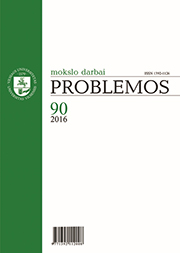PRIEVARTA KAIP MODERNYBĖS SĄLYGA: F. T. MARINETTI IR G. SIMMELIO ATVEJIS
VIOLENCE AS THE CONDITION OF MODERNITY: THE CASE OF F. T. MARINETTI AND G. SIMMEL
Author(s): Nerijus MileriusSubject(s): Aesthetics, Contemporary Philosophy, Social Theory, Sociology of Culture, Film / Cinema / Cinematography, Sociology of Art
Published by: Vilniaus Universiteto Leidykla
Keywords: violence; war; Marinetti; futurism; Simmel;
Summary/Abstract: The article deals with the general conditions of cinematic violence. The question of artistic violence quite often is treated as the question of autonomy of art. Nevertheless, such interpretation is not sufficient as it neglects the fact that under conditions of modernity violence functions not only as an aesthetic, but also as a social phenomenon. In attempt to interpret the status of violence in modernity, the case of the futurist manifesto by F. T. Marinetti and the theory of G. Simmel are examined. In Marinetti’s manifesto, the speed, the technology, and violence are treated as the means to transform society. As a consequence, the notion of war is also glorified. After beginning of the World War I, Marinetti fails to rethink the notion of war in accordance with new political and social circumstances. Contrary to Marinetti, Simmel develops a positive notion of war as an effective tool to overcome the so-called blasé attitude and give hope of renewal of society. Thus, despite differences in interpretation and in political attitude, both Marinetti and Simmel attribute to violence and war the meanings of resistance and messianism. The resistance and messianic interpretation of violence and war is inevitable part of the discourse of modernity. Nevertheless, it is argued that such interpretation should not be treated as self-sufficient as the status of the violence is transformed in the times of post-industrial society and postmodernity.
Journal: Problemos
- Issue Year: 2016
- Issue No: 90
- Page Range: 115-125
- Page Count: 11
- Language: Lithuanian

